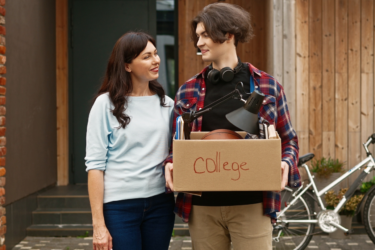“I would rather it be done under my roof than somewhere else.”
When it comes to teens drinking under their own parents’ roofs, many parents share this same sentiment: they would much rather their teen drink around them at home than anywhere else.
Other reasons behind their approval stem from removing the taboo of drinking, encouraging better habits for when they’re older, creating a safer and monitored environment while the teen is drinking, and remembering what drinking was like when “we were their age.”
While many parents approve, there are just as many parents who are against the idea, and some who are even unsure after weighing both sides. However, this controversial topic includes many sides, and it’s important to take note of what the experts recommend.
WAIT, IS IT EVEN LEGAL?
Often before the conversation even begins, several parents wonder if teens drinking at home is even allowed. What may come as a shock to many is that underage consumption of alcohol is actually legal in many states, including Louisiana, when consumed in a private residence. Louisiana’s policy, which can be found in the Alcohol Policy Information System (a project of the National Institute on Alcohol Abuse and Alcoholism,) also states that it is legal when consumed with a parent/guardian or spouse present.
BUT AREN’T THEY STILL DEVELOPING?
According to the American Academy of Pediatrics (AAP), yes, and because of this, AAP urges parents to establish rules and prevent their teens from drinking because it’s a “critical time for brain growth.”
Lynn R. Schechter, PhD, MPAP, a medical psychologist, explains, “Alcohol is a toxin, so it will impact the brain of any person who consumes it. A human brain continues to develop for the first 25 years of life, and so that is, in theory, when it is more vulnerable to the impact of substances since neuronal connections are still forming. This is especially problematic because the frontal lobe, which is responsible for making good decisions, isn’t yet developed, and alcohol in the body can impede its development.”
Knowing the effects alcohol might have on your teens ahead of time could also be a teachable moment.
One local parent, Jacki S. (initial is used because of requested anonymity), shares, “Allowing your teens (older to high school/college teens) to taste various alcohols and drink in moderation teaches them to drink more responsibly and enables a parent to have productive conversations with their children before they leave home. I want to see how it affects my child so we can talk about it, particularly as it relates to making sure you have control over yourself, make smart decisions, and not drive after alcohol has been consumed.”
IS IT REALISTIC TO THINK TEENS WON’T DRINK?
“As a psychologist (and as a parent) of course I have to say the answer is no. We know that teenagers drink and that they will do it whether we want them to or not. So, it makes sense that parents have had the mindset that ‘if my kid’s going to drink, I’d like to be around to supervise them and make sure they’re safe,’ or ‘I want to make sure they’re not going to drink and drive.’ Other parents may feel that it will remove what I’d like to call the ‘taboo appeal’ of drinking, which can sometimes lurk in the background of kids’ minds as they get ready to leave for college and they’ve been prohibited from drinking until they leave,” says Dr. Schechter.
When polling parents on whether or not they would allow their teens to drink at home, many said yes because it lessens the appeal of drinking when they are older.
Local mom Katherine G., agrees with this. “It’s the nature of maturing. Children want to rebel against the boundaries that are set for them. If they have access to alcohol at home, it loses the ‘cool’ factor. My parents always said I could have it if I wanted, but I thought it tasted disgusting, and I would roll my eyes when my friends got hold of cheap beer. I happily passed on it because I had no interest at all. All of the wildest kids I knew growing up had the strictest parents.”
WHAT DOES THE RESEARCH SAY?
Parents who are against teens drinking at home feel that by allowing them to consume alcohol at a younger age only puts them on the road to addiction and offers a gateway to other illegal activities.
A research study in the Journal of Studies on Alcohol and Drugs that spanned over 15 years found that “allowing adolescents to drink at home is neither inherently protective nor risky but depends on the family context.” One of these factors to consider includes whether or not there is already a family history of alcohol problems.
Kevin Murnane, PhD, Associate Director for Basic Sciences Research, Louisiana Addiction Research Center, also shares, “Research has shown that adolescent exposure to alcohol can change brain chemistry and brain activity in brain areas critical for decision making. This puts the child at greater risk of developing many neuropsychiatric disorders, including alcohol and drug addiction.”
In AAP’s Alcohol Use by Youth policy statement, lead author Joanna Quigley, MD, FAAP, explains that parents should not downplay these risks, but instead, keep the conversations open and model healthy habits.
SO, SHOULD THEY OR SHOULDN’T THEY?
If you’re looking for an easy yes or no, you won’t find it here. Considering the facts from the experts, as well as what is legal in our state, there unfortunately isn’t a yes or no answer. The decision will ultimately come down to what the parent feels is best for their teen.
Dr. Schechter adds, “The decision of whether to allow teenagers to drink at home is not a simple one but a personal one, and there is no one-size-fits-all answer in my opinion. Parents should be aware of the power that they have to influence their teens’ attitudes and behavior even through early adulthood.”
If you’re looking for more insight and help with navigating through the decision process, reach out to your child’s doctor or another parent you trust.





